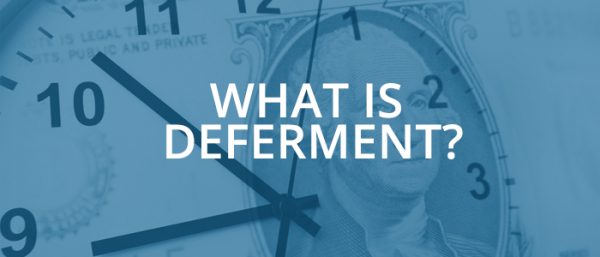If you are having a hard time paying your student loan, you may be eligible to put your student loan on deferment or into forbearance.
Deferment means that you are not required to pay your loan interest if your loan qualifies, and you have to meet economic conditions and have a low income. Forbearance means that you have to continue to pay interest, but you may have difficulty paying even though your income is too high to qualify for deferment.
You need to do something about your student loans, and not just hope that the mess will go away on its own.
Here’s How:
First, you need to contact your lender to explain the situation to them. This is the first step of the application process. They will then provide you a form that you will need to fill out. This form will also ask for documents to prove that you qualify for deferment.
Second, gather the documents that the form requires, and fill out the paperwork. Send in the form and copies of the documents that your lender requested. You need to continue to make your payments until you learn that your deferment has been approved.
Third, if you are not contacted in week or two, call back to confirm that they have received the information, and to follow up on the status of your deferment application. You can continue to do this at weekly intervals until your application has been processed. Don’t forget to be polite during these calls.
Finally, you need to work to adjust the situation that has caused you to be put into deferment. This means that you need to sit down and look at your income situation and change it. Look for a new job, and stay on a budget so you can get your other debt manageable. You may need to get a second job so that you can take care of the situation, and prevent it from happening again. You are only allowed to be on economic deferment for a total of three years.
Tips:
If you are having a difficult time being approved, or you are denied you may want to contact the FSA Ombudsman to help you with the negotiation process. You can access their website www.ombudsman.ed.gov or by calling them at 1-877-557-2575. Even while you are negotiating, you need to continue to pay until you have your deferment approved.
If you do not already have a Direct Federal Loan, you may want to refinance to one. This will also give you the option of decreasing your monthly payment, even though it does extend the length of time you will need to pay on the loan.
Once you are in deferment, there is a limit on the amount of time your loan can be in deferment. The limit is three years, but your lender may have to verify your situation every six months or year. It is important to stay on top of the situation. If this is going to be a long-term situation and you will have a hard time making payments, you should look into income based payments, and student loan forgiveness. Both of these options may make it easier to pay off your student loans. The income based payments may be zero and after twenty or thirty years (depending on when you took out the loan), you will have the remainder forgiven.
What You Need:
Student Loan Lender Number
Proof of Economic Hardship/Unemployment

